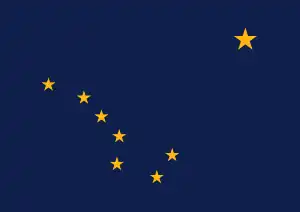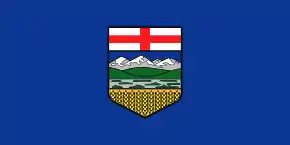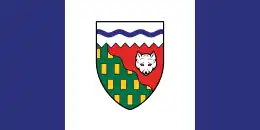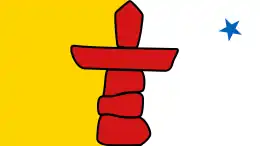 The 2012 Whitehorse logo | |
| Host city | Whitehorse, Yukon |
|---|---|
| Country | |
| Nations | |
| Teams | |
| Athletes | 1,472 |
| Events | 264 |
| Opening | March 4, 2012 |
| Closing | March 10, 2012 |
The 2012 Arctic Winter Games was a winter multi-sport event which took place in Whitehorse, Yukon , Canada, between 4–10 March 2012.
The Arctic Winter Games is the world's largest multisport and cultural event for young people of the Arctic. The Games is an international biennial celebration of circumpolar sports and culture held for a week, each time with a different nation or region as the host. AWG celebrates sports, social interaction and culture. The Games contributes to creating an awareness on cultural diversity, and develops athletes to participate in the competitions with the focus on fair play. The Games binds the Arctic countries together and includes traditional games such as Arctic sports and Dené games.
Around 1,500 athletes from nine teams participated in the games.[1]
Organization
The 2012 Arctic Winter Games were set in Whitehorse, Yukon. This marked this the sixth times the games were hosted by Whitehorse. The general manager of the games were Chris Milner, an athlete in the 1990 Arctic Winter Games.[2]
Marketing
2012's mascot was a Husky dog named 'Borealis'. The dog sports a Whitehorse Arctic Winter Games 2012 shirt and, as is common in Huskies, has different coloured eyes (known as heterochromia).[3]
Participants
Nine contingents participated in the 2012 Arctic Winter Games. The number of athletes sent by each contingent is shown in parentheses in the list below.[1][4]
 Alaska, United States (281)
Alaska, United States (281) Greenland (91)
Greenland (91) Northern Alberta, Canada (179)
Northern Alberta, Canada (179) Northwest Territories, Canada (276)
Northwest Territories, Canada (276) Nunavik, Quebec, Canada (53)
Nunavik, Quebec, Canada (53) Nunavut, Canada (227)
Nunavut, Canada (227) Sámi people (33)
Sámi people (33) Yamalo-Nenets, Russia (62)
Yamalo-Nenets, Russia (62) Yukon, Canada (270) (host)
Yukon, Canada (270) (host)
Venues
The 2012 games were held at various sports venues, schools and facilities in Whitehorse.
Sports venues


The following venues hosted sports events during the games. All locations were located within Whitehorse.[5]
| Venue | Events |
|---|---|
| CGC-ATCO Ice | Figure skating, ice hockey, short track speed skating |
| CGC-Fieldhouse | Indoor soccer |
| CGC-Flexihall | Volleyball |
| Curling Club | Curling |
| F.H. Collins Secondary School | Basketball |
| Grey Mountain | Biathlon, snowshoe biathlon |
| Kwanlin Dün Cultural Centre | Dene games, various cultural events, workshops |
| Mount Lorne | Dog mushing |
| Mount McIntyre | Cross country skiing |
| Mount Sima | Alpine skiing, snowboarding |
| Porter Creek Secondary School | Badminton |
| Selkirk School | Table tennis |
| Shipyards Park | Snowshoeing |
| Takhini Arena | Ice hockey |
| Vanier Secondary School | Arctic sports, gymnastics |
| Yukon College | Wrestling |
Cultural venues
.jpg.webp)
The following venues hosted cultural events during the games. All locations were located within Whitehorse.[5]
| Venue | Events |
|---|---|
| Arts Underground | Various events, workshops |
| Baked Café | Various events |
| Canada Games Centre | Opening ceremony, closing ceremony |
| Centre de la francophonie | Various events |
| CGC & ATCO Stage | Various events |
| First Ave & Main St, CGC | Workshops |
| Yukon Arts Centre | Various events, workshops |
Medal tally
| Rank | Team | Gold | Silver | Bronze | Total |
|---|---|---|---|---|---|
| 1 | 61 | 67 | 62 | 190 | |
| 2 | 50 | 34 | 17 | 101 | |
| 3 | 46 | 47 | 29 | 122 | |
| 4 | 40 | 37 | 27 | 104 | |
| 5 | 32 | 30 | 54 | 116 | |
| 6 | 18 | 15 | 17 | 50 | |
| 7 | 10 | 14 | 12 | 36 | |
| 8 | 5 | 16 | 29 | 50 | |
| 9 | 4 | 4 | 5 | 13 | |
| Totals (9 entries) | 266 | 264 | 252 | 782 | |
The Games
Sports
264 events in 20 sport disciplines were scheduled in the 2012 Arctic Winter Games program. Freestyle skiing was removed from the program, after its debut appearance at the 2010 Arctic Winter Games. 4 skiing sports were held, with alpine skiing, biathlon, cross-country skiing and snowboarding. 2 snowshoe events were held, with snowshoe biathlon and snowshoeing. 2 racquet sports were held, with badminton and table tennis. 2 skating events were held, those being figure skating and short track speed skating. Team sports held were basketball, indoor soccer, ice hockey, volleyball and curling. Traditional Inuit sports were also held, with Arctic sports, Dene games, dog mushing and wrestling, the latter also including events for traditional wrestling. Also held was gymnastics.[6]
 Alpine skiing (13) ()
Alpine skiing (13) () Arctic sports (35) ()
Arctic sports (35) () Badminton (10) ()
Badminton (10) () Basketball (2) ()
Basketball (2) () Biathlon (14) ()
Biathlon (14) () Cross-country skiing (24) ()
Cross-country skiing (24) () Curling (2) ()
Curling (2) () Dene games (24) ()
Dene games (24) () Dog mushing (6) ()
Dog mushing (6) () Figure skating (13) ()
Figure skating (13) ()_pictogram.svg.png.webp) Gymnastics (6) ()
Gymnastics (6) () Ice hockey (3) ()
Ice hockey (3) () Indoor soccer (5) ()
Indoor soccer (5) () Short track speed skating (20) ()
Short track speed skating (20) () Snowboarding (20) ()
Snowboarding (20) () Snowshoe biathlon (14) ()
Snowshoe biathlon (14) () Snowshoeing (14) ()
Snowshoeing (14) () Table tennis (12) ()
Table tennis (12) ()_pictogram.svg.png.webp) Volleyball (2) ()
Volleyball (2) () Wrestling (25) ()
Wrestling (25) ()
Calendar
| OC | Opening ceremony | ● | Cultural events | ● | Event competitions | 1 | Event finals | CC | Closing ceremony |
| March | 3 Sun |
4 Mon |
5 Tue |
6 Wed |
7 Thu |
8 Fri |
9 Sat |
10 Sun |
Total | |
|---|---|---|---|---|---|---|---|---|---|---|
| Ceremonies | OC | CC | ||||||||
| Cultural events | ● | ● | ● | ● | ● | ● | ● | ● | ||
| 4 | 4 | 5 | 13 | |||||||
| 5 | 8 | 8 | 5 | 9 | 35 | |||||
| ● | ● | ● | ● | ● | 10 | 10 | ||||
| ● | ● | ● | ● | ● | 2 | 2 | ||||
| 4 | 4 | 4 | 2 | 14 | ||||||
| 6 | 6 | 6 | 6 | 24 | ||||||
| ● | ● | ● | ● | 2 | 2 | |||||
| 4 | 4 | 2 | 6 | 8 | 24 | |||||
| 2 | 2 | 2 | 6 | |||||||
| 4 | 8 | 1 | 13 | |||||||
| 1 | 5 | 6 | ||||||||
| ● | ● | ● | ● | ● | 1 | 2 | 3 | |||
| ● | ● | ● | ● | ● | ● | 5 | 5 | |||
| 4 | 4 | 4 | 8 | 20 | ||||||
| 4 | 4 | 4 | 8 | 20 | ||||||
| 4 | 4 | 4 | 2 | 14 | ||||||
| 4 | 4 | 6 | 14 | |||||||
| ● | 4 | 4 | ● | 4 | 12 | |||||
| ● | ● | ● | ● | 2 | 2 | |||||
| 1 | 12 | 12 | 25 | |||||||
| Total events | 0 | 0 | 40 | 49 | 49 | 54 | 53 | 19 | 264 | |
| March | 3 Sun | 4 Mon | 5 Tue | 6 Wed | 7 Thu | 8 Fri | 9 Sat | 10 Sun | Total | |
Culture
The 2012 Arctic Winter Games were the first to have a relay. Rather than passing a baton or torch, however, a song was relayed. The youth at the games passed on a song, was in effort to promoting heritage awareness and cultural diversity.[7]
Hodgson Trophy
The Hodgson trophy for fair play and team spirit is awarded at the end of every games. The trophy has been awarded since 1978 and named for Stuart Milton Hodgson, Commissioners of the Northwest Territories from 1967 to 1979. The 2012 Hodgson Trophy was awarded to Team Nunavut.[8]
References
- 1 2 "Find an athlete". Awg2012.gems.pro. Retrieved 15 December 2021.
- ↑ "Staff bios". Awg2012.org. Archived from the original on 27 December 2013. Retrieved 15 December 2021.
- ↑ "Mascot". Awg2012.org. Archived from the original on 27 December 2013. Retrieved 15 December 2021.
- ↑ "Participating teams". Awg2012.org. Archived from the original on 27 December 2013.
- 1 2 "ULU News, 2 March 2012" (PDF). Arcticwintergames.org. Retrieved 14 December 2021.
- ↑ "Sports". Awg2012.org. Archived from the original on 27 December 2013. Retrieved 15 December 2021.
- ↑ "Song relay". Awg2012.org. Archived from the original on 27 December 2013. Retrieved 15 December 2021.
- ↑ "The Hodgson Trophy". Arcticwintergames.org. Retrieved 25 August 2021.